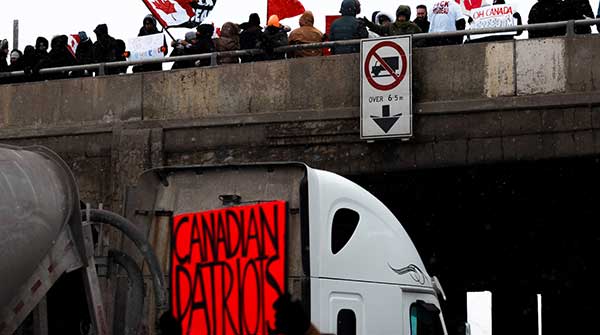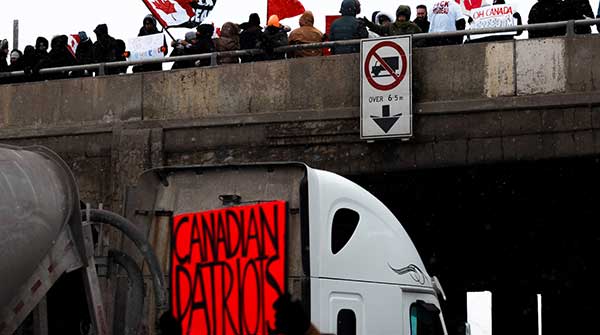Landmark ruling declares invocation of Emergencies Act illegal
 In a long-awaited and unequivocal decision, the Honourable Justice Richard Mosley has declared the Liberal cabinet’s invocation of the Emergencies Act as not just questionable but outright illegal.
In a long-awaited and unequivocal decision, the Honourable Justice Richard Mosley has declared the Liberal cabinet’s invocation of the Emergencies Act as not just questionable but outright illegal.
Let’s be crystal clear: the government’s move to enact the Emergencies Act, an unprecedented action taken on Feb. 14, 2022, in response to the Freedom Convoy protests, has been found to be in flagrant violation of not only sections 3 and 17 of the Emergencies Act itself but also Part 1 of the Constitution Act of 1982 and sections of the Charter of Rights and Freedoms.
Justice Mosley didn’t mince words in his 126-page Reasons for Judgment, stating that the government’s decision lacked reasonableness, justification, transparency, and intelligibility. He made it abundantly clear that the Emergencies Act was meant to safeguard fundamental rights, even in emergency situations where temporary measures might be necessary.
 Photo by Dillon Kydd |
| Related Stories |
| How governments get us to blindly accept their agendas
|
| Trudeau eroding our trust in government
|
| The Trudeau government is on a quest for censorship
|
Contrast this with the findings of the Public Order Emergency Commission (POEC), which raised serious doubts about the Act’s invocation. On Feb. 17, 2023, Justice Paul Rouleau “concluded that the very high threshold required for the invocation of the (Emergencies) Act was met.” He contended that “cabinet had reasonable grounds to believe there existed a national emergency arising from threats to the security of Canada,” resulting in Prime Minister Justin Trudeau declaring the Act. Rouleau’s dubious conclusion was made all the more dubious by this comment: “I do not come to this conclusion easily as I do not consider the factual basis for it to be overwhelming.”
In his finding, Mosley pointed out that the Governor in Council was required by the Emergencies Act legislation to show that “the reasons for its decision” are “reasonable” and “demonstrate ‘justification, transparency and intelligibility.”
Extensive evidence was brought to the court’s attention. This included the testimony of RCMP Superintendent Denis Beaudoin. He conceded that RCMP officers gathered names of citizens whose bank accounts were to be seized and frozen and “did not apply a standard, such as reasonable grounds, before sharing information with the financial institutions.”
Justice Mosley’s ruling exposed significant flaws in the government’s actions, particularly its failure to follow due process when seizing and freezing citizens’ bank accounts. The revelation that RCMP officers didn’t apply any reasonable standard before sharing information with financial institutions is nothing short of alarming.
The government’s attempt to dismiss the matter as moot because the Emergencies Act was revoked on Feb. 23, 2022, was rightfully rejected by Justice Mosley. He ruled that “the Applicants have established that an adversarial context continues to exist and have built a record upon which meaningful judicial review of the decision to invoke the Act and issue the Proclamation … can occur”. The federal court ruled that the POEC inquiry was not a substitute for judicial review.
The applicants who sought judicial review of the Emergencies Act invocation, including former registered nurse Kristen Nagle, the Canadian Frontline Nurses, volunteer firefighter Jeremiah Jost, Canadian military veteran Edward Cornell, retired police officer Vincent Gircys, and former Canadian Armed Forces chaplain Harold Ristau, have been vindicated. Gircys and Cornell had their bank accounts frozen without any judicial authorization or review process, a move previously reserved under Canadian law for terrorists or enemy nations.
Cornell said his experience of having his bank accounts seized was traumatic. “I broke no law, yet the government seized my accounts and froze my hard-earned money. I am not a criminal. I am not a terrorist. I am a retired Canadian military veteran who honourably served his country… I feel betrayed by my own government.”
The Canadian Civil Liberties Association and the Canadian Constitution Foundation have been instrumental in challenging the legality and constitutionality of the government’s actions on behalf of Jost, Cornell, Gircys, and Ristau.
Justice Mosley’s ruling underscores the importance of judicial review in such matters and raises serious questions about the questionable justification provided by the Rouleau inquiry. The POEC was never intended to assess the legality and constitutionality of measures adopted by the Act, and it’s a relief that a judicial review has proceeded despite the government’s control of information and reluctance to disclose it.
Mosley concluded, “If the Court declines to hear these cases, a precedent may be established that so long as the government can revoke the declaration of an emergency before a judicial review application can be heard, the courts will have no role in reviewing the legality of such a decision.”
Ray McGinnis is a senior fellow with the Frontier Centre for Public Policy. His forthcoming book is titled Unjustified: The Emergencies Act and the Inquiry that Got It Wrong.
For interview requests, click here.
The opinions expressed by our columnists and contributors are theirs alone and do not inherently or expressly reflect the views of our publication.
© Troy Media
Troy Media is an editorial content provider to media outlets and its own hosted community news outlets across Canada.

